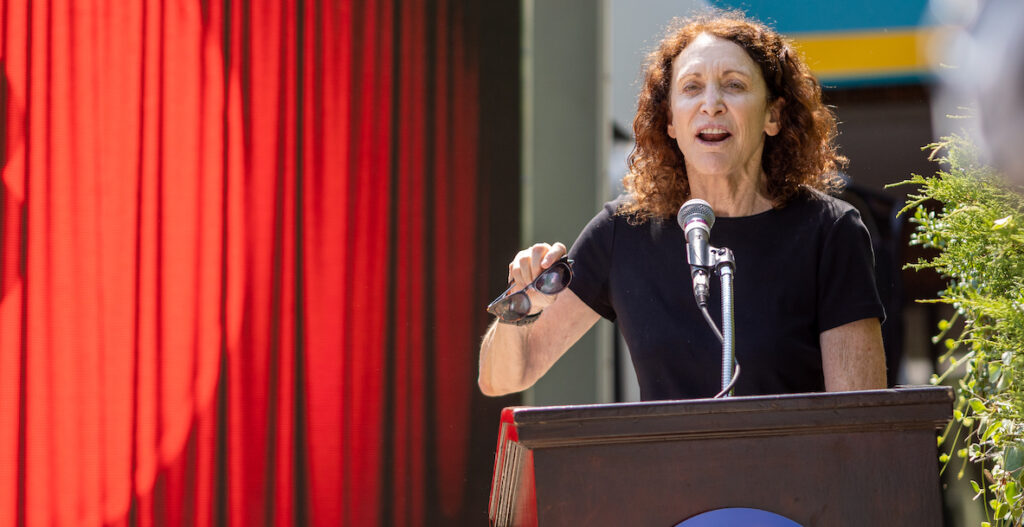I think about art all the time. It means the world to me.
When asking elected officials about arts and culture issues over many years I often hear: “Culture matters. Philadelphia is great. We have the big organizations and the small ones. Art is important.” Or, I hear a story about how one has had some contact with the arts, sometime in their life.
None of this is not true. But this is where I think people are missing the point.
I speak to you today as someone who believes in our city, truly loves it and believes in the power of art. I have seen its first-hand impact on` lives, communities and, by extension, on the civic life of our city.
I am challenging all of you to take a pledge to support the cultural sector in substantive meaningful ways.
This is what we know: We know that countless lives have been changed, inspired, mended, uplifted, rerouted, inspired by art. We know the stories, and we have seen the data — over and over and over. Mural Arts has hard and soft data, and so do many other cultural organizations. And we have seen insightful and informative reports from the Greater Philadelphia Cultural Alliance, year after year. They tell us what I am saying now: Art matters.
So many of us are connected to the arts in large and small ways. We are self-taught creators or took art classes; we are culture workers; we are makers of some sort; we sit on boards and attend events. Think about what it feels like to be in a museum or a theater or attending a concert. Think about that feeling when we are drawn into absolute focus and our heart is ignited.
We feel something. What is it?
When we make art, or experience art, we feel the essential experience of being human.
The essence of art is its ability to engage us fully. And what I mean by that is its ability to tap into our imagination, to challenge us, to make us more empathetic. It asks us sometimes to think differently. It can be our teacher; it helps us grieve; and it is like a flashlight helping us find hope in the face of darkness. And, finally, art helps us celebrate and acknowledge differences, and at the same time acknowledge our common humanity.
All the work that goes on in our sector points to the importance of cultural citizenship, social healing and sustainable communities. Sometimes in our work I feel a sense of shared opportunity and collective responsibility … true exercises of democracy.
Art demonstrates everyone’s right to be seen and heard. Art inspires actions around education, community and economic development. Art challenges and can push changes in social and government systems and inspire them to work more effectively and creatively. And as we have seen first hand in our Porch Light, art education and restorative justice programs, art makes us witnesses.
Art must be in the center
And yet, and yet. In spite of all this, we live with what I call a scarcity mindset. Ironically, this exists in a city with so much. In this city, the arts and people who make it are always on the precipice. For some reason, even though it holds so much, the container that holds the arts feels weak. Uncertain.
But please note: This is an old way of thinking — and that is what I want you to hear from me tonight. Art is not an embellishment, entertainment or decoration.
I have had so many conversations with people at varying levels in our city, and topics around the arts are all too often missing from the public discourse. And so what is it we want to hear when we list needs and aspirations? Well, the need for beauty and meaning, to shine a light on our intrinsic human desire to create, to acknowledge the importance of full cultural citizenship, and to nurture the hope for social healing.
What I am asking you to do is to reframe things. Move art to the center and reframe it as public interest — something critical, invaluable. And keep it there.
Our urgent task right now is to help people see that our collective well being depends on recognizing the power of the arts and their ability to move change forward.
What the next mayor must do
So, what do we need you to do?
I am challenging all of you to take a pledge to support the cultural sector in substantive meaningful ways. This is my agenda for you:
-
- Create a department of the arts, and appoint a cabinet level director who reports directly to the mayor.
- Make sure there is a dedicated funding stream for arts in Philadelphia.
- Protect and grow the cultural fund.
- Create a bill of rights for individual artists.
- Be a bridge between Philadelphia and the world and engage in a real knowledge exchange.
- Increase fellowship programs for artists.
For more, see the Greater Philadelphia Cultural Alliance Policy Platform that came out last week. It is important. Read it.
Here is the irony: If nothing happens, we will keep going, because the cultural sector is incredibly resilient and determined. Almost more than most. But how sad is that? Think about all that would be lost, all that potential.
The poet Adrianne Rich says:
What would it mean
To live in a city whose people were
changing each other’s despair
into hope?
And then she answers:
You yourself must change it
You yourself must change it.
We must change it. I believe we not only have the capacity, we have the responsibility.
Jane Golden is executive director of Mural Arts Philadelphia. This was adapted from a speech she gave at a mayoral forum hosted by the Barnes Foundation.
The Citizen welcomes guest commentary from community members who stipulate to the best of their ability that it is fact-based and non-defamatory.

